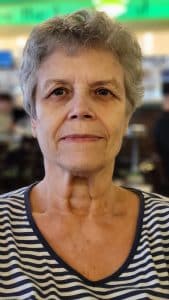Retirement Turned Upside Down

The immediate aftermath was a scary time for Linda and Renee. Aphasia was an unknown concept to them; the lack of information or understanding of what was happening and how to address it left them in an uncomfortable position.
“We didn’t know anything about aphasia,” said Renee. “Even in the hospital and with doctors, a lot of people think of it as a mental deficit, as in she just didn’t understand. They’re bringing in speech therapists and she’s pointing to the wrong picture when they say a word, and that’s scary.
It was a difficult time coming to terms with life after the stroke while making strides in recovery that were small and inconsistent. After one year without much progress, they received sobering news from their neurologist.
“The neurologist told us that one year is the mark that they gauge recovery and we probably can’t expect much more,” said Renee. “For me, I remember leaving that appointment devastated thinking, ‘We can’t communicate. What are we going to do?’”
Persistence Leads to Discovering AAC Devices
The comment from the neurologist knocked them down, but it would not keep them on the floor too long. Renee found Lingraphica’s TalkPath Therapy and started using it to help her mom.
“I found TalkPath Therapy while researching options and suggested that Mom work with it for practice. That’s where I learned about Lingraphica’s AAC devices for the first time and thought we would give it a try.”
Linda was not working with a speech therapist at the time, so she was able to receive In-Home device training from the Lingraphica team. Both Linda and Renee raved about the level of patience and support displayed by everyone involved in the process. Referring to her Clinical Training Consultant, Kelly, Linda said, “She was wonderful. If I can’t remember she will tell me again. She was patient all the time. If I needed another thing she would say ‘Do you remember where it is?’ and if I don’t know she would teach me how to do it again.”
Even Renee, almost 2,000 miles away, was able to take part in the training. “The training was excellent. I live far away and I’m not there to be tech support. It was nice to have the training so I could see it too and just know that support is available.”
Linda’s hard work and commitment to using her Lingraphica device paid off. Renee thinks back to that comment made at the one-year follow-up and is just blown away by the progress she has made.
A Useful Tool for Communication and Therapy
Linda does not need her device to accomplish great feats, fulfill a lifelong dream, or deliver an inspirational speech. In Linda’s world, this device helps her complete everyday routine activities. It helps her prepare for grocery shopping or doctor’s appointments. If she needs to provide information over the phone like an address, her device is there to make sure there are no mistakes or miscommunication.
“For example, I’m be home and want to communicate three words,” said Linda. “I will try to find them on my device so when I go to the store I can look on my device and say the words. I can ask ‘Do you have this?’ and I can say the words because I can hear them.”
To Renee this device has been a game changer. It has helped her mother stay connected and continue working on recovery. Sometimes, that therapy work is even unintentional. “She is always calling me to ask about a word or if I can text her a word so she can remember it,” said Renee. “Once she has the word, she then enters it into the device. That’s more practice with her letters and with the word. That’s her using the device for therapy.”
Lingraphica’s mission is to improve the lives of people with aphasia. This was certainly the case for Linda and Renee. “The device empowered my mom and gave her more confidence,” said Renee. “The device is extremely helpful, but what’s especially noteworthy are the times that she doesn’t have to use the device because just having it gave her the confidence to find her words.”



